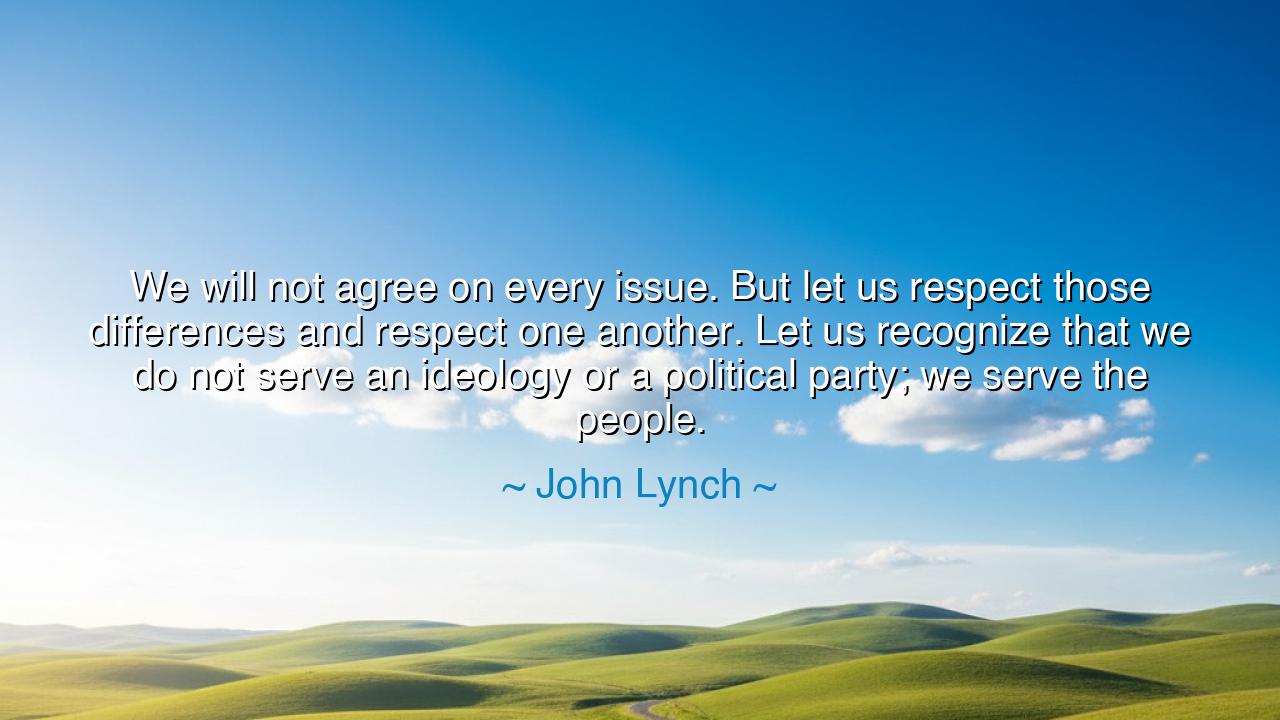
We will not agree on every issue. But let us respect those
We will not agree on every issue. But let us respect those differences and respect one another. Let us recognize that we do not serve an ideology or a political party; we serve the people.






“We will not agree on every issue. But let us respect those differences and respect one another. Let us recognize that we do not serve an ideology or a political party; we serve the people.” Thus spoke John Lynch, and in his words is a wisdom that transcends the chambers of government and speaks to the heart of human community. For division is as old as mankind, and disagreements spring forth like weeds in every field of life. Yet it is not disagreement that destroys us—it is the loss of respect, the forgetting that beyond all banners and beliefs, we share one humanity.
The ancients too wrestled with this truth. In the councils of Athens, men of different minds debated fiercely, yet the city endured when they remembered they served the polis, not themselves. In Rome, senators quarreled endlessly, yet when they placed the Republic above faction, their unity brought strength. But when party and ambition rose above the common good, the Republic fell into ruin. Lynch’s words stand in this same tradition: let not ideology become your master, for you were born to serve the people, and through them, the greater whole.
Consider the example of Abraham Lincoln. In a nation torn by slavery and civil war, he did not deny the existence of profound disagreement. Instead, he called his people to remember their shared bond: “We are not enemies, but friends.” His leadership did not erase division, but it anchored it in respect, recognizing that to heal a nation, one must serve all, not just a party or a creed. This echoes Lynch’s vision: we need not think alike to work together; we need only remember that service belongs to the people first.
Disagreement is not weakness; it is the proof of freedom. Where all voices echo the same, tyranny reigns. But when differences are held in dignity, they become the forge of progress. One sees a piece of the truth, another sees a different piece, and together, a fuller picture emerges. Yet when differences become scorn, when men despise one another for not thinking alike, the house fractures, and all within it suffer collapse. Thus, respect is not courtesy alone—it is survival.
O children of the future, take heed: you will live in times of division, as every generation has. You will be tempted to despise those who oppose you, to treat them as enemies rather than fellow servants of the whole. Resist this. For the one you call opponent may tomorrow be your ally, and the one you despise may hold the key to wisdom you have yet to see. Hold to respect, for without it, every community, every nation, every family will fall into chaos.
The lesson is clear: serve not your pride, nor your party, nor your ideology, but the people—the living men, women, and children who depend on your labor, your voice, your decisions. Respect differences, not because they are easy, but because they are necessary. The measure of greatness is not how one treats the like-minded, but how one honors those who differ.
Therefore, let your practice be this: when you debate, do so with dignity. When you disagree, do so without hatred. When you serve, remember whom you serve—not a symbol, not a faction, but real lives. Teach your children that strength lies not in conquest over one another, but in respect and service to the whole.
So I say unto you: remember John Lynch’s wisdom. Disagreement is the condition of freedom, but respect is the condition of peace. Ideologies rise and fall, parties come and go, but the people endure. Serve them, respect them, and through them, serve the eternal bond of humanity itself.






AAdministratorAdministrator
Welcome, honored guests. Please leave a comment, we will respond soon